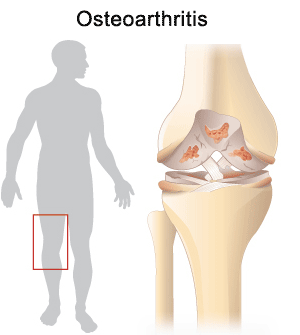Medical Library
Knee Articles- Quadriceps Muscle Strains
- Meniscal Tears
- Anterior Cruciate Ligament (ACL) Tear
- Posterior Cruciate Ligament (PCL) Tear
- Medial Collateral Ligament (MCL) Tear
- Lateral Collateral Ligament (LCL) Tears
- Anterior Knee Pain
- Patello-femoral Pain (Commonly Called Chondromalacia Patella)
- Patellar Tendinitis (Jumper's Knee)
- Knee Osteoarthritis
- Iliotibial Band Friction Syndrome (ITBS)
- Knee Replacement
Pick a Body Area
Knee Osteoarthritis

Osteoarthritis of the knee occurs when the cartilage coverings on the end of the femur and the top of the tibia wear out. The tibia has two special cartilage pads called menisci (one is called a meniscus). This cartilage becomes flattened, bone spurs form, the joint becomes inflamed, range of motion is lost, there is ensuing weakness, pain and difficulty with walking, climbing stairs, and getting in/out of chairs. Physical therapy can help with recovery of range of motion, strength, walking skills, and pain management. Aquatic therapy (often involving a customized exercise program) can be helpful.
After total knee replacement (also called a total knee arthroplasty), physical therapy helps with recovery of range of motion, pain management, strength, balance and walking skills, and endurance. Commonly, patients say, "Why did I have this surgery? I am worse off now." You must be patient. Give yourself at least 3 months to recover.
For more info, see osteoarthritis.
Possible Treatments
- Core Strengthening Video
- Cryotherapy or Cold Therapy Video
- Electrotherapeutic Modalities
- Gait or Walking Training Video
- Heat Pack Video
- Isometric Exercise Video
- Knee Active Range of Motion Video
- Knee Joint Mobilization Video
- Knee Passive Range of Motion Video
- Knee Resistive Range of Motion Video
- Neuromuscular Electrical Stimulation Video
- Proprioceptive Neuromuscular Facilitation (PNF) Video
- Proprioception Exercises Video
- Physical Agents
- Soft Tissue Mobilization Video
- Stretching/Flexibility Exercise Video
- Core Strengthening
Possible Treatment Goals
- Improve Balance
- Improve ability to bear weight/stand on the leg(s)
- Improve Fitness
- Improve Function
- Optimize Joint Alignment
- Improve Muscle Strength and Power
- Increase Oxygen to Tissues
- Improve Proprioception
- Decrease Postoperative Complications
- Improve Range of Motion
- Improve Relaxation
- Self-care of Symptoms
- Improve Safety
- Improve Tolerance for Prolonged Activities
- Improve Wound Healing
Additional Resources
Disclaimer
The information in this medical library is intended for informational and educational purposes only and in no way should be taken to be the provision or practice of physical therapy, medical, or professional healthcare advice or services. The information should not be considered complete or exhaustive and should not be used for diagnostic or treatment purposes without first consulting with your physical therapist, occupational therapist, physician or other healthcare provider. The owners of this website accept no responsibility for the misuse of information contained within this website.
